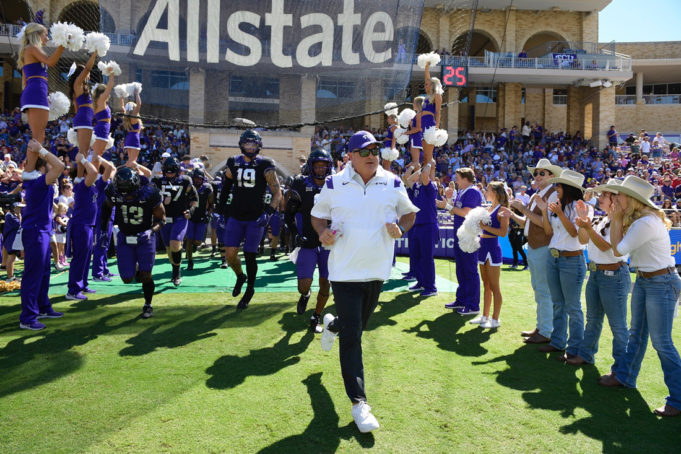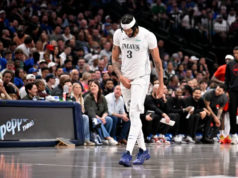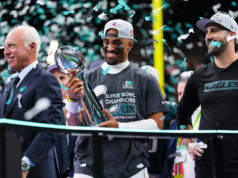“Dad, why do you look mad?” my oldest son innocently asked me as I returned home from watching TCU’s 3-point loss at home to Colorado. I was. But probably not for the reasons you think. I was upset with myself for not expecting this game to go the way it did, and I suspect the TCU team and coaching staff were probably thinking the same.
The headlines after the final gun sounded on Saturday were — as expected — all about Coach Deion Sanders turning a one-win team into a slayer of last year’s second-best squad in the nation. That’s fair, but truthfully this was a battle between two unknown entities. Both TCU and Colorado have among the lowest quantity of returning starters of any university in the nation, but the media — self included — did a poor job of forecasting how good Colorado would probably be, even though the evidence was present.
Truthfully, this game was more about Shedeur Sanders (Deion’s son) and Travis Hunter than Coach Prime. Hunter, now a household name, started at both cornerback and wide receiver for the Buffs. Sanders, the player, would be quarterbacking at Alabama, Georgia, or Ohio State if he weren’t suiting up for his dad. Hunter was considered the No. 1 overall recruit in the nation coming out of high school when he inked his first set of headlines by foregoing FBS altogether to join Coach Sanders’ Jackson State squad. Those two, along with several others, executed big plays that left everyone coaching, playing, or spectating in purple scrambling for answers.
But that’s all the time I have for CU until next season, when they join the conference and become just another stop on the schedule. The relevant story for Frog fanatics is what TCU did. New offensive coordinator Kendall Briles will receive some heat after this game. It’s fairly obvious he thinks someone should give him a shot at coaching his own program, but replacing Garrett Riley, who left to be the offensive coordinator at Clemson this season, will have to do for now. The man at the trigger, Chandler Morris, acquitted himself well for being a multi-year multi-injury player who has more fingers on one hand than career starts. Morris completed 24 passes of 42 attempts for two touchdowns and ran for another. He looked mostly accurate in the short and middle passing game but poor on his deep balls.
The offensive game plan — consistent with last season’s trends — was a balanced-spread attack, and the Frogs threw the ball five more times than they rushed it. Emani Bailey was the workhorse with 164 yards on 14 carries, and transfer running back Trey Sanders (so many Sanderses to keep track of) did bruising duty with only 46 yards on 15 rushes but scored three times.
The incredible black eye on the offense’s performance were two end-zone interceptions off Morris, one nabbed by safety Trevor Woods as he undercut a pass deep into the middle end zone and the other stolen by Hunter on a release into the flat within the shadow of the goal post. The other obvious miscue was a rare missed field goal by Griffin Kell.
Briles will be criticized for abandoning what had been a productive running game during the Frogs’ final drive, which is fair, but 42 points on the board — 14 forfeited to interceptions on the precipice of touchdowns and a missed 43-yard field goal — aren’t a terrible day from a Frog phase who lost their quarterback, three best receivers, two best running backs, and their best two lineman from last year’s team. TCU’s defense, on the other hand, is the real story of this game, and it’s becoming an increasingly darker tale.
Last year’s Frog stoppers weren’t the best. “Bend, don’t break” was the cliche people like myself threw out all the time, and it was mostly a winning formula unless the offense wasn’t quite clicking or was playing Georgia. Some of that was made possible by elite players with special talents like linebacker Dee Winters and cornerback Tre’Vius Hodges-Tomlinson. With those studs gone, the defense was lost in the mountains against the quarterbacking of Sanders and the receiving of Hunter. Sanders absolutely embarrassed defensive coordinator Joe Gillespie’s 3-3-5 alignment. Deep-in routes and underneath switches were open all day long.
Defenders gave head-scratching cushions to Sanders’ receivers, and his quick release left no resistance as gold and white players gained yards with impunity. Frog tackling was as poor as I’ve seen in years. And like last year, the front three linemen provided no threat to the quarterback on their own.
Blitzes were effective (Sanders was sacked four times) but called far too infrequently for fear of Buffalo receivers striding past one-on-one coverage, but they found gargantuan holes in the zone anyway when TCU players missed tackles or chased after Sanders haplessly while allowing him to sling the ball outside the pocket.
Colorado’s poorest position group on offense was overwhelmingly their offensive line, and Gillespie was even more feeble at exploiting that. The only takeaway the Frog defense managed was a fumble recovery that Colorado suffered when freshman Dylan Edwards was tackled into the leg of his own blocking receiver, which popped the ball out for Frog safety Millard Bradford to recover. The change of possession did lead to a Frog touchdown to even the score at the time, but there was always an overwhelming feeling that Colorado could score at will, demonstrated by the 510 passing yards accumulated by Sanders, a Buffalo record.
Despite the kidney shank that this game delivered to the home faithful, there is still plenty to be excited about from a squad that is basically brand new — at least in terms of difference makers — across the board. A three-mistakes-fewer offense was in position to score 59 points, and 42 is decent from the second-leanest returning-starter roster in Division 1. The defense was objectively poor, and I expect Gillespie will continue to make changes until something sticks and the points-against average dives way down. Dykes is a smart man, and he knows — as I suspect many do — that former head coach Gary Patterson’s stubbornness to dismiss ineffective assistants is what cost him his place on the sideline. If Gillespie can’t show a marked improvement in his unit through the course of the season, don’t expect to see him in purple past January.
The expectation against Nicholls State next week is that the game will be a shutout and the offense will play clean ball while scoring a minimum of 60 points as TCU prepares for new conference opponent Houston the following week. I expect the Frogs to win sans drama Saturday night. Besides, only Texas A&M and Baylor give out bags of money to “little” guys and lose.












